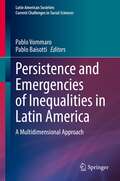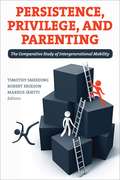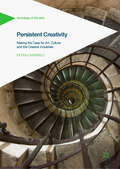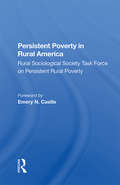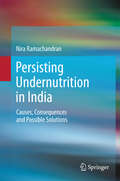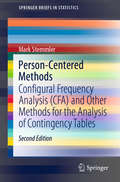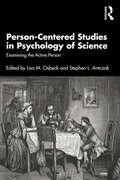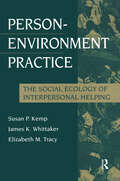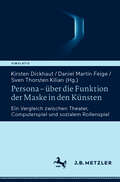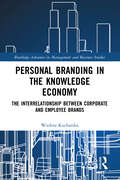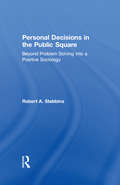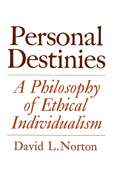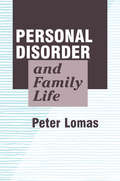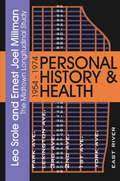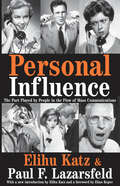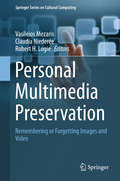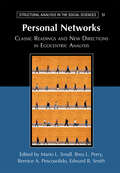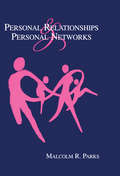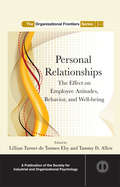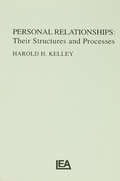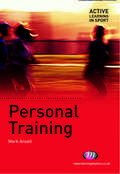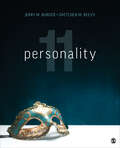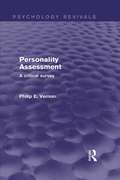- Table View
- List View
Persistence and Emergencies of Inequalities in Latin America: A Multidimensional Approach (Latin American Societies)
by Pablo Baisotti Pablo VommaroThis book adopts a multidimensional approach to analyze both the historical and emerging factors that contribute to make Latin America and the Caribbean the most unequal region in the world. Social inequality is a historical characteristic of the region, but at the beginning of the 21st century, a handful of progressive governments seemed to be adopting policies that could reduce this historical trend. Many of these efforts, however, were blocked or reversed by the COVID-19 pandemic, which both exposed the persistence of historical trends and contributed to the emergency of new forms of inequality in the region.The different chapters in this contributed volume adopt a multidimensional, intersectional, perspective to analyze both the persistence and the emergency of social devices of production and reproduction of inequalities in the diverse Latin American and Caribbean temporal spatialities. The issues analyzed in the different chapters revolve around four main axes: a) persistence of generational and intergenerational inequalities; b) structural gender inequality; c) intertwined social inequalities: race, class and social structure and; c) historical and economic dimension of inequality. Persistence and Emergencies of Inequalities in Latin America: A Multidimensional Approach will be of interest to researchers interested in the study of social inequality and social justice in different fields of the human and social sciences, such as sociology, political science, history, economics, anthropology and education. It will also be a valuable tool for policy makers and social activists engaged in the discussion, advocacy and implementation of public policies aimed at reducing social inequalities.
Persistence, Privilege, and Parenting: The Comparative Study of Intergenerational Mobility
by Markus Jäntti Timothy Smeeding Robert EriksonAmericans like to believe that theirs is the land of opportunity, but the hard facts are that children born into poor families in the United States tend to stay poor and children born into wealthy families generally stay rich. Other countries have shown more success at lessening the effects of inequality on mobility—possibly by making public investments in education, health, and family well-being that offset the private advantages of the wealthy. What can the United States learn from these other countries about how to provide children from disadvantaged backgrounds an equal chance in life? Making comparisons across ten countries, Persistence, Privilege, and Parenting brings together a team of eminent international scholars to examine why advantage and disadvantage persist across generations. The book sheds light on how the social and economic mobility of children differs within and across countries and the impact private family resources, public policies, and social institutions may have on mobility. In what ways do parents pass advantage or disadvantage on to their children? Persistence, Privilege, and Parenting is an expansive exploration of the relationship between parental socioeconomic status and background and the outcomes of their grown children. The authors also address the impact of education and parental financial assistance on mobility. Contributors Miles Corak, Lori Curtis, and Shelley Phipps look at how family economic background influences the outcomes of adult children in the United States and Canada. They find that, despite many cultural similarities between the two countries, Canada has three times the rate of intergenerational mobility as the United States—possibly because Canada makes more public investments in its labor market, health care, and family programs. Jo Blanden and her colleagues explore a number of factors affecting how advantage is transmitted between parents and children in the United States and the United Kingdom, including education, occupation, marriage, and health. They find that despite the two nations having similar rates of intergenerational mobility and social inequality, lack of educational opportunity plays a greater role in limiting U.S. mobility, while the United Kingdom’s deeply rooted social class structure makes it difficult for the disadvantaged to transcend their circumstances. Jane Waldfogel and Elizabeth Washbrook examine cognitive and behavioral school readiness across income groups and find that pre-school age children in both the United States and Britain show substantial income-related gaps in school readiness—driven in part by poorly developed parenting skills among overburdened, low-income families. The authors suggest that the most encouraging policies focus on both school and home interventions, including such measures as increases in federal funding for Head Start programs in the United States, raising pre-school staff qualifications in Britain, and parenting programs in both countries. A significant step forward in the study of intergenerational mobility, Persistence, Privilege, and Parenting demonstrates that the transmission of advantage or disadvantage from one generation to the next varies widely from country to country. This striking finding is a particular cause for concern in the United States, where the persistence of disadvantage remains stubbornly high. But, it provides a reason to hope that by better understanding mobility across the generations abroad, we can find ways to do better at home.
Persistent Creativity: Making The Case For Art, Culture And Creative Industries (Sociology of the Arts)
by Peter CampbellRecent years have seen the increasing valuation and promotion of ‘creativity’. Future success, we are often assured, will rest on the creativity of our endeavours, often aligned specifically with ‘cultural’ activity. This book considers the emergence and persistence of this pattern, particularly with regards to cultural policy, and examines the methods and evidence deployed to make the case for art, culture and the creative industries. The origins of current practices are considered, as is the gradual accretion of a broad range of meanings around the term ‘creative’, and the implications this has for the success of the wider ‘Creativity Agenda’. The specific experience of the city of Liverpool in adopting and furthering this agenda both in the UK and beyond is considered, as is the persistence of a range of problematic, and often contradictory, assumptions and practices relating to this agenda up to the present day.
Persistent Poverty In Rural America
by Rural Sociological SocietyA team of anthropologists, economists, geographers, political scientists, social workers, and sociologists examine the leading explanations for why poverty persists in rural America. Their findings discredit established theories such as the culture of poverty and suggest new explanations for rural poverty and new directions for antipoverty programs
Persisting Undernutrition in India
by Nira RamachandranThe book revisits the causes of persisting under nutrition in India, but moves away from the usual focus on women and children to a broader view of the entire population. It estimates the economic losses resulting from ignoring under nutrition in the adult working population and questions the current narrow focus of nutrition interventions, suggesting that a family-based approach may provide quicker results and long-term sustainability. It compares the best and worst performing states in the country to glean learnings from both successes and failures and emphasizes the need to hand over the ownership of nutrition outcomes from the state to the community and family for more sustainable results. The book is organized in three sections: Part 1 details the nutrition status of the population, regional variations in nutrition outcomes and government response in terms of interventions. Part 2 reviews issues and concerns like gender discrimination, poor child nutrition status, ineffective implementation of government programmes in the field and the possible impacts of emerging issues like climate change. Part 3 seeks solutions from both international and country experiences.
Person-Centered Methods: Configural Frequency Analysis (CFA) and Other Methods for the Analysis of Contingency Tables (SpringerBriefs in Statistics)
by Mark StemmlerThis book offers a comprehensible overview of the statistical approach called the person-centered method. Instead of analyzing means, variances and covariances of scale scores as in the common variable-centered approach, the person-centered approach analyzes persons or objects grouped according to their characteristic patterns or configurations in contingency tables. This second edition explores the relationship between two statistical methods: log-linear modeling (LLM) and configural frequency analysis (CFA). Both methods compare expected frequencies with observed frequencies. However, while LLM searches for the underlying dependencies of the involved variables in the data (model-fitting), CFA examines significant residuals in non-fitting models. New developments in the second edition include: Configural Mediation Models, CFA with covariates, moderator CFA, and CFA modeling branches in tree-based methods. The new developments enable the use of categorical together with continuous variables, which makes CFA a very powerful statistical tool. This new edition continues to utilize R-package confreq (derived from Configural Frequency Analysis), much updated since the first edition and newly adjusted to the new R base program 4.0. An electronic supplement is now available with 18 R-scripts and many datasets.
Person-Centered Studies in Psychology of Science: Examining the Active Person
by Stephen L. Antczak Lisa M OsbeckThis unique collection examines "the acting person" as an important unit of analysis for science studies, using an integrative approach of in-depth case studies to explore the cognitive, social, cultural, and personal dimensions of a series of key figures in the sciences, from Goethe to Kepler to Rachel Carson. Opening up key questions about what science is, and what comprises a scientist, the volume offers an accessible introductory approach to psychology of science, a growing area in Science and Technology Studies (STS). Case studies focus on the psychological contexts of the contributions for which the scientist is known. Without diminishing its epistemic authority, science is presented as a psychologically saturated human activity, one that is especially illustrative of the way social, cognitive, and personal processes intermingle to both facilitate and impede scientific accomplishment. Each case study ends with a set of discussion questions, providing a valuable resource for student reflection and discussion, inviting analysis of similarities and differences in science in the context of very different lives and different projects. Person-Centered Studies in Psychology of Science is essential reading for scholars and graduates interested in the psychology of science, personality theory, social, or cognitive psychology, general psychologists, and theoretical psychologists.
Person-Environment Practice: Social Ecology of Interpersonal Helping (Modern Applications of Social Work Series)
by Elizabeth M. Tracy James K. Whittaker Susan P, KempPerson-Environment Practice addresses a core but long- neglected dimension in social work and human services practice; accurate environmental assessment and strategic environmental intervention. Despite the centrality of "person-environment" as a key construct in direct practice, the domain of environmental assessment/intervention has received relatively little systematic attention in the practice literature. For a variety of reasons, the core focus of direct practice assessment and change strategies has centered more on "person" than "environment." This book seeks to redress that imbalance. Ironically, the relative lack of attention to environmentally oriented practice persists even as current demands of practice fall increasingly under the rubric of what we here call "environmental intervention," defined as both action in the environment and the process of transforming individual and collective perspectives through critical analysis of the impact of environmental conditions. The authors argue that the ability to understand "environment" from the client's perspective and to function effectively in the environmental domain is central to many emergent areas of practice such as practice with extended families and personal networks, practice from a "strengths" perspective, and culturally competent practice. In Person-Environment Practice, the authors offer a coherent critique and overview of environmental assessment and intervention congruent with the demands of both newly emerging and established interpersonal helping approaches within social work's domain. Robert Halpern of the Erikson Institute for Advanced Studies in Child Development described the book as "as clear, thoughtful and subtle a discussion of how to consider the environment in interpersonal helping as I have seen in the literature" and Anthony Maluccio of Boston College called the book "a timely and exciting contribution, with appreciation and respect for social work practices and qualities of inspiration as well as intellectual stimulation" Susan P. Kemp is assistant professor, School of Social Work, The University of Washington, Seattle. James K. Whittaker is professor, School of Social Work, The University of Washington, Seattle. Elizabeth M. Tracy is associate professor, Mandel School of Applied Social Sciences, Case Western Reserve University, Cleveland, Ohio.
Persona – über die Funktion der Maske in den Künsten: Ein Vergleich zwischen Theater, Computerspiel und sozialem Rollenspiel (Simulatio. Theatertechniken in Literatur, Medien und Wissenschaft)
by Daniel Martin Feige Kirsten Dickhaut Sven Thorsten KilianDer Sammelband thematisiert Masken und Maskierungen. Im Vergleich der Künste untersucht er die funktionale Verwendung dieses Theaterrequisits, das eine Technik impliziert, und die Ausgestaltungen von Persona in den Künsten, Maskenverwendungen, -gestaltungen und -problematisierungen, die stets die Produktion von Fiktion und/oder Simulation reflektieren. Zehn Beiträge analysieren Beispiele seit dem 18. Jahrhundert der bildenden Kunst, des Digitalen, des Computerspiels, des Theaters, der erzählenden Literatur und der sozialen Rolle, die jeweils die Maske als Fiktions- oder Simulationsgenerator verstehen, thematisieren und kulturell vergleichend beschreiben. Pirandello stellt dabei grundsätzlich einen wichtigen, aber nicht den einzigen Referenzpunkt dar.
Personal Branding in the Knowledge Economy: The Inter-relationship between Corporate and Employee Brands (Routledge Advances in Management and Business Studies)
by Wioleta KucharskaPersonal Branding in the Knowledge Economy: The Interrelationship between Corporate and Employee Brands aims to contribute to the academic debate about the marketization of individuals’ knowledge, creativity, and personal images, alongside a growing interest in the whole area of branding in the networked economy based on knowledge. Personal branding and personal knowledge are critical assets of knowledge workers and key drivers of their development and innovative performance. Both strongly influence the individual success of knowledge workers in the networked and knowledge-driven economy. Personal brands are dynamically shifting from the side-lines to the center of the modern economy and the authenticity of the brands of personal ingredients for their ability to create value. They are one of the three key pillars of value creation in the social media environment, therefore significantly contribute to digital business models. The book will be of interest to researchers, academics, professionals, and students in the fields of organizational branding, marketing, management, and communications.
Personal Decisions in the Public Square: Beyond Problem Solving Into A Positive Sociology
by Robert A. StebbinsThis work looks into how, why, and when people pursue things in life that they desire, those that make their existence attractive and worth living. Robert A. Stebbins calls this "Positive Sociology," the study of what people do to organize their lives such that they become substantially rewarding, satisfying, and fulfilling. Western society has many challenges: crime, drug addiction, urban pollution, daily stress, domestic violence, and overpopulation. Significant levels of success in avoiding these problems brings a noticeable measure of tranquility, but it does not necessarily generate a positive life.Personal Decisions in the Public Square draws upon, in large part, the sociology of leisure, a "happy science." Among the basic concepts in the sociology of leisure are activity and human agency. The centrality of positive activity is one of its hallmarks and separates it from other social science specialties. Stebbins's positive sociology centers on conceptual roots found in the "serious leisure" perspective. This theoretical framework synthesizes three main forms of leisure (serious, casual, and project-based) while showing their distinctive features, similarities, and interrelationships. Positive sociology also considers two other domains of life: work and non-work obligations.This new approach focuses on the pursuit of "that which makes life worth living." Stebbins explores goals that are important to all people, such as negotiating the right work/family or obligation/leisure balance and the tricky relationship between money and happiness. Research scientists or the general public may find the ideas presented in this volume help them better understand and negotiate situations, by showing how to approach them in a positive way rather than as "problems" that need to be solved.
Personal Destinies: A Philosophy of Ethical Individualism
by David L. NortonWhat is the meaning of life? Modern professional philosophy has largely renounced the attempt to answer this question and has restricted itself to the pursuit of more esoteric truths. Not so David Norton. <p><p>Following in the footsteps of Plato and Aristotle, Kierkegaard and Nietzsche, Jung and Maslow, he sets forth a distinctive vision of the individual's search for his place in the scheme of things. Norton's theory of individualism is rooted in the eudaimonistic ethics of the Creeks, who viewed each person as innately possessing a unique potential it was his destiny to fulfill. Very much the same idea resurfaced in modern times with the British idealists and Continental existentialists. <p><p>The author reviews these antecedents, showing how his theory differs from those of his predecessors. After a fascinating chapter on "The Stages of Life," Norton shows how the mature consciousness of one's destiny leads to direct, intimate knowledge of other persons, and how this in turn provides the basis for social morality. The conception of justice in which this theory culminates, rooted as it is in essential human differences, provides a challenging alternative to the much-discussed theories of Rawls and Nozick.
Personal Disorder and Family Life
by Peter LomasThis work looks into how, why, and when people pursue things in life that they desire, those that make their existence attractive and worth living. Robert A. Stebbins calls this "Positive Sociology," the study of what people do to organize their lives such that they become substantially rewarding, satisfying, and fulfilling. Western society has many challenges: crime, drug addiction, urban pollution, daily stress, domestic violence, and overpopulation. Significant levels of success in avoiding these problems brings a noticeable measure of tranquility, but it does not necessarily generate a positive life.Personal Decisions in the Public Square draws upon, in large part, the sociology of leisure, a "happy science." Among the basic concepts in the sociology of leisure are activity and human agency. The centrality of positive activity is one of its hallmarks and separates it from other social science specialties. Stebbins's positive sociology centers on conceptual roots found in the "serious leisure" perspective. This theoretical framework synthesizes three main forms of leisure (serious, casual, and project-based) while showing their distinctive features, similarities, and interrelationships. Positive sociology also considers two other domains of life: work and non-work obligations.This new approach focuses on the pursuit of "that which makes life worth living." Stebbins explores goals that are important to all people, such as negotiating the right work/family or obligation/leisure balance and the tricky relationship between money and happiness. Research scientists or the general public may find the ideas presented in this volume help them better understand and negotiate situations, by showing how to approach them in a positive way rather than as "problems" that need to be solved.
Personal History and Health
by Leo SroleScientists, philosophers, and storytellers often question why human beings appear to remain constant while existing in a state of change at the same tune. Among those who explore and expose dramatic conflicts between human stability and flux, the number of behavioral scientists has remained relatively low - that is, until Leo Srole followed the progress of a large cohort of people in his Midtown Longitudinal Study. This statistical project was designed to analyze mental health and assess human biological, social, and psychological change. New York's Upper East Side was the study's focus, a sociologically insular community, consisting of loosely differentiated neighborhoods, with a population of generalizable significance that transcended individual characteristics. Midtowners, studied hi 1954 then reinterviewed in 1974, were the subjects of analysis. After a twenty-year hiatus, Srole's eagerly awaited findings and outcomes are available.Personal History and Health by Ernest Joel Millman is a posthumous synthesis of Leo Srole's seminal behavioral study. This book presents the principal findings of MLS - with emphasis on adult mental health predictors, not cause-and-effect relationships. Srole used such biophysical correlates as gender and generation, mental health and history of somatic disorders, and the statistical methods of multiple correlation and regression analysis to predict average mental health. Through this work, Srole's pioneering exploration of social age and adult mental health - in particular how they differed for the women and men of the Midtown Longitudinal Study - has been completed. Personal History and Health is the conclusive, long-range view of those changes.These are Srole's final perspectives on mental health. As was characteristic of him, it is not exploratory or confirmatory, nor does it declare conclusions; rather, it raises questions. Millman offers an accessible yet sophisticated presentation of sociomedical sampling and analysis in language which may be understood by statistically unsophisticated readers, placing all of the explanations, details, figures, and tables in comprehensive statistical appendices. This book will appeal to those in the mental health field, sociomedical scientists, and those with interest in the socioeconomic correlates of health status and/or social mobility in urban society.
Personal Influence: The Part Played by People in the Flow of Mass Communications
by Elihu Katz Paul F. Lazarsfeld Elmo RoperFirst published in 1955, "Personal Influence" reports the results of a pioneering study conducted in Decatur, Illinois, validating Paul Lazarsfeld's serendipitous discovery that messages from the media may be further mediated by informal "opinion leaders" who intercept, interpret, and diffuse what they see and hear to the personal networks in which they are embedded. This classic volume set the stage for all subsequent studies of the interaction of mass media and interpersonal influence in the making of everyday decisions in public affairs, fashion, movie-going, and consumer behavior. The contextualizing essay in Part One dwells on the surprising relevance of primary groups to the flow of mass communication. Peter Simonson of the University of Pittsburgh has written that "Personal Influence was perhaps the most influential book in mass communication research of the postwar era, and it remains a signal text with historic significance and ongoing reverberations...more than any other single work, it solidified what came to be known as the dominant paradigm in the field, which later researchers were compelled either to cast off or build upon." In his introduction to this fiftieth-anniversary edition, Elihu Katz discusses the theory and methodology that underlie the Decatur study and evaluates the legacy of his coauthor and mentor, Paul F. Lazarsfeld.
Personal Knowledge and Beyond
by Jim Spickard Shawn Landres Meredith B. McguireOver the last decade the sociology of religion and religious studies have experienced a surge of ethnographic research. Scholars now use ethnography, as anthropologists have long done, as a valued source of knowledge from which they draw their pictures of the religious world. Yet, many researchers of religion have yet to grapple with the issues that are changing anthropologists' use of the method. Personal Knowledge and Beyond seeks to foster a cross-disciplinary rethinking of ethnography's possibilities and limits for the study of religions. It provides an overview of recent debates while also pushing them in new directions. In addition, it offers critiques of some of anthropology's reigning conceptualizations. The volume brings together many of the best-known ethnographic researchers of religion, including Karen McCarthy Brown, Lynn Davidman, Armin Geertz, Cheryl Townsend Gilkes, Mary Jo Neitz, and Thomas Tweed. Together, they share substantively from their fieldwork and consider the consequences for the study of religion of rejecting old ethnographic myths, as well as the risks of replacing them with new ones. The volume will be of interest to students as well as to experienced scholars in the field.
Personal Multimedia Preservation
by Vasileios Mezaris Claudia Niederée Robert H. LogieThis unique text/reference advocates a novel forgetful approach to dealing with personal multimedia content in the long run, which is inspired by the effectiveness of human forgetting as a mechanism for helping us to stay focused on important things. The text presents theoretical foundations, technologies, applications, and case study results that help the reader to understand the problems and challenges associated with personal digital preservation, and the solutions that can be developed in response to these challenges.Topics and features: Highlights the value of an intelligent and selective approach to personal multimedia preservation, involving managed forgetting and contextualized remembering; considers how a conceptual understanding of human memory function can be used to inspire the design of digital managed preservation and forgetting; discusses methods that endow computers with capabilities to understand digital content, in order to support intelligent preservation decisions; examines the assessment of the importance of information items, introducing the concepts of memory buoyancy and preservation value; reviews methods for preserving the context associated with a digital item, and for assessing how this context evolves over time; proposes a reference model for the Preserve-or-Forget (PoF) approach which is integrative, value-driven, brain-inspired, forgetful, and evolution-aware; describes the integration of preservation functionalities in a Personal Information Management (PIM) application; presents a user study on a photo selection task, using the results to design methods for automatically selecting important photos from personal collections.This interdisciplinary volume provides significant insights from computer science, engineering and psychology that will be of great interest to researchers involved in multimedia and software engineering, multimedia preservation, cultural informatics, digital heritage, and the digital humanities.
Personal Networks: Classic Readings and New Directions in Egocentric Analysis (Structural Analysis in the Social Sciences)
by Bernice Pescosolido Edward B. SmithSocial networks are ubiquitous. The science of networks has shaped how researchers and society understand the spread of disease, the precursors of loneliness, the rise of protest movements, the causes of social inequality, the influence of social media, and much more. Egocentric analysis conceives of each individual, or ego, as embedded in a personal network of alters, a community partially of their creation and nearly unique to them, whose composition and structure have consequences. This volume is dedicated to understanding the history, present, and future of egocentric social network analysis. The text brings together the most important, classic articles foundational to the field with new perspectives to form a comprehensive volume ideal for courses in network analysis. The collection examines where the field of egocentric research has been, what it has uncovered, and where it is headed.
Personal Relationships and Personal Networks (LEA's Series on Personal Relationships)
by Malcolm R. ParksThe effort to understand personal relationships has traditionally focused on the individual characteristics of participants. Personal Relationships and Personal Networks takes this analysis a step further, focusing on research linking participants' feelings and actions within a given personal relationship to the larger social context surrounding it. Author Malcolm R. Parks expands on the idea that the initiation, development, maintenance, and dissolution of relationships are inextricably connected to each participant's social network-a perspective that allows for a better appreciation of our connection to the world, and a greater understanding our significant power as social actors. This book offers a new way to consider basic notions about how relationships form, such as how particular people meet, and how relationships are started. Among many findings, the volume demonstrates that individuals in relationships feel closer and generally more connected when they also have a greater amount of contact with the members of each other's personal networks and when they believe that network members support their relationship. Additional topics discussed include how this social context model is applicable to different types of relationships; how participants interact with network members; how social networks are involved in the deterioration of personal relationships; and what drives change in relationships. Students, researchers, and professionals in a wide variety of disciplines such as communication, psychology, sociology, anthropology, family studies, clinical psychology, public health nursing, education, and social work will find this book useful, as will anyone seeking to better understand their own personal relationships.
Personal Relationships: The Effect on Employee Attitudes, Behavior, and Well-being (SIOP Organizational Frontiers Series)
by Tammy D. Allen Lillian Turner de Tormes EbyWe know that positive, fulfilling and satisfying relationships are strong predictors of life satisfaction, psychological health, and physical well-being. This edited volume uses research and theory on the need to belong as a foundation to explore various types of relationships, with an emphasis on the influence of these relationships on employee attitudes, behaviors and well-being. The book considers a wide range of relationships that may affect work attitudes, specifically, supervisory, co-worker, team, customer and non-work relationships. The study of relationships spans many sub-areas within I/O Psychology and Social Psychology, including leadership, supervision, mentoring, work-related social support, work teams, bullying/interpersonal deviance and the work/non work interface.
Personal Relationships: Their Structures and Processes (Distinguished Lecture Series)
by Harold H. KelleyFirst published in 1982. Routledge is an imprint of Taylor & Francis, an informa company.
Personal Training (Active Learning in Sport Series)
by Mark AnsellThis is a key text for all those on sport science courses. It covers all the essential areas for a study of personal training including fitness testing, nutrition, psychology, training principles, health and fitness, training in different contexts and business issues. Students therefore gain all the required multi-disciplinary knowledge with an understanding of how to apply this in practice. Throughout the text, theoretical explanation is supported by case studies, practical and reflective exercises and guidance on further study.
Personality
by Jerry M. Burger Gretchen M. ReevyNow published by SAGE! In Personality, the historical underpinnings of core theories and research come alive through biographical and contextual illustrations. Author Jerry M. Burger, and new co-author Gretchen M. Reevy, use vivid stories and discussions to challenge learners to critically consider the discipline’s approach to diversity, research science, and its future as a holistic field of study. With a balance of both theory and research, along with application sections and personality tests, students gain hands-on experience and a comprehensive understanding of the subject matter. Every chapter in this Eleventh Edition has been thoroughly updated, such as sections on Extraversion-Introversion, Dream Interpretation, and Gender Roles, to reflect the most recent research. It also features 400 new references, a new research topic on Narcissism, and two new personality scales. This title is accompanied by a complete teaching and learning package. Contact your SAGE representative to request a demo. Digital Option / Courseware SAGE Vantage is an intuitive digital platform that delivers this text’s content and course materials in a learning experience that offers auto-graded assignments and interactive multimedia tools, all carefully designed to ignite student engagement and drive critical thinking. Built with you and your students in mind, it offers simple course set-up and enables students to better prepare for class. Learn more. LMS Cartridge: Import this title’s instructor resources into your school’s learning management system (LMS) and save time. Don’t use an LMS? You can still access all of the same online resources for this title via the password-protected Instructor Resource Site. Learn more.
Personality
by Jerry M. Burger Gretchen M. ReevyNow published by SAGE! In Personality, the historical underpinnings of core theories and research come alive through biographical and contextual illustrations. Author Jerry M. Burger, and new co-author Gretchen M. Reevy, use vivid stories and discussions to challenge learners to critically consider the discipline’s approach to diversity, research science, and its future as a holistic field of study. With a balance of both theory and research, along with application sections and personality tests, students gain hands-on experience and a comprehensive understanding of the subject matter. Every chapter in this Eleventh Edition has been thoroughly updated, such as sections on Extraversion-Introversion, Dream Interpretation, and Gender Roles, to reflect the most recent research. It also features 400 new references, a new research topic on Narcissism, and two new personality scales. This title is accompanied by a complete teaching and learning package. Contact your SAGE representative to request a demo. Digital Option / Courseware SAGE Vantage is an intuitive digital platform that delivers this text’s content and course materials in a learning experience that offers auto-graded assignments and interactive multimedia tools, all carefully designed to ignite student engagement and drive critical thinking. Built with you and your students in mind, it offers simple course set-up and enables students to better prepare for class. Learn more. LMS Cartridge: Import this title’s instructor resources into your school’s learning management system (LMS) and save time. Don’t use an LMS? You can still access all of the same online resources for this title via the password-protected Instructor Resource Site. Learn more.
Personality Assessment: A critical survey (Psychology Revivals)
by Philip E. VernonOriginally published in 1964, the aim of this book was to analyse the psychological processes involved in understanding personality, and to consider how the psychologist could help in making more accurate assessments. Professor Vernon discusses in detail the scientific status of psychoanalytic and other ‘depth’ theories of motivation, the value of different types of psychotherapeutic treatment and counselling, the influence of upbringing on the development of personality, and the effectiveness of projective techniques. He also examines the reasons for the highly variable results obtained with personality tests and questionnaires. As well as providing a balanced review of theories of personality and of various types of test, this work made a fresh contribution to developing improved techniques of assessment.
